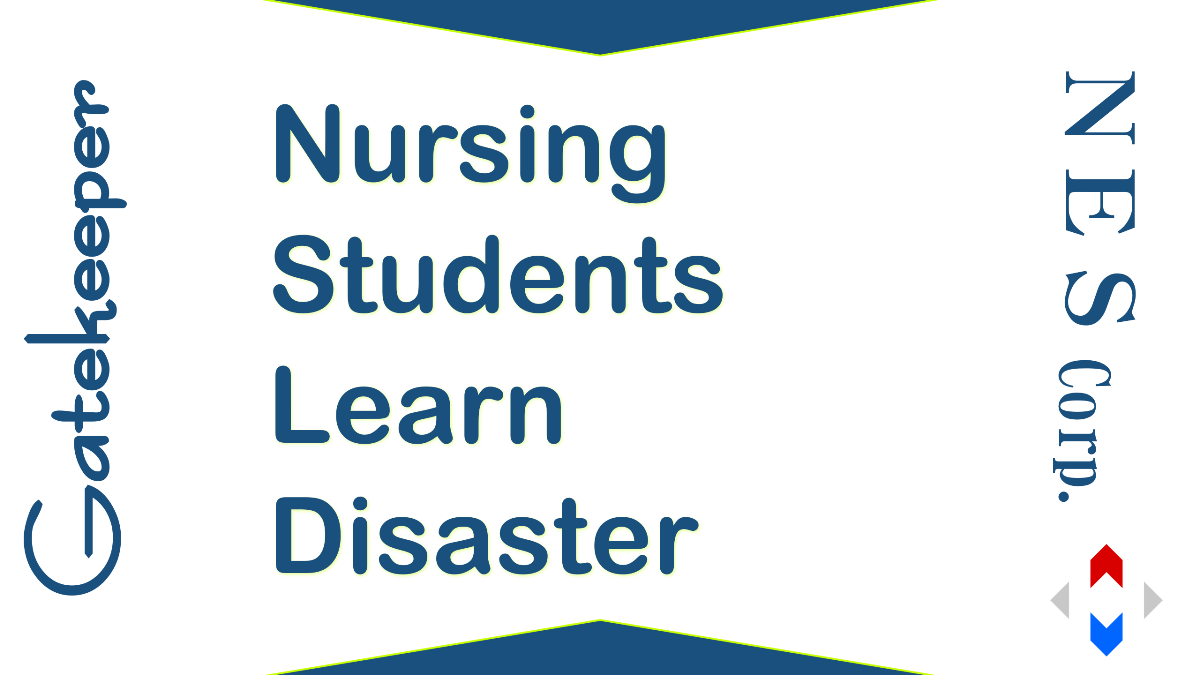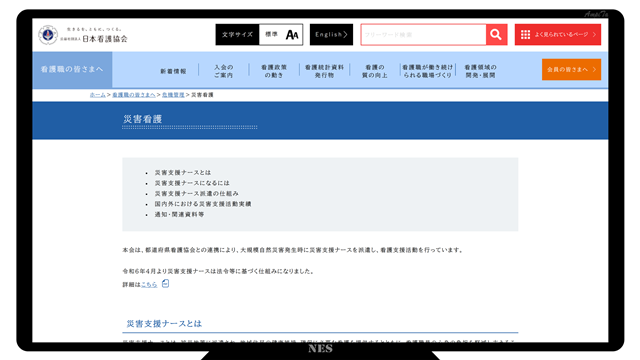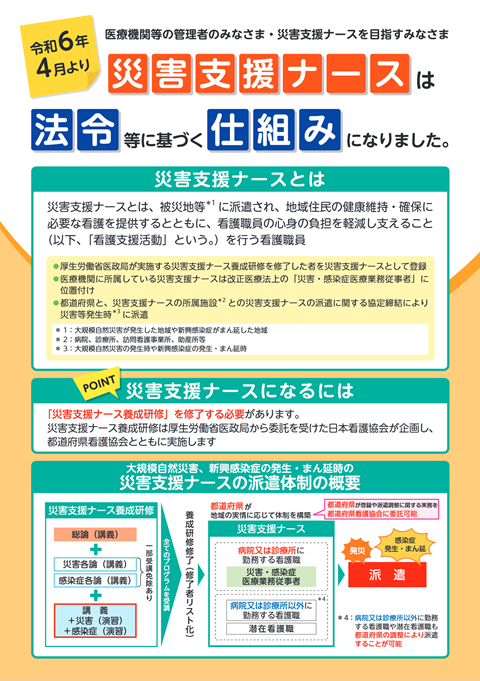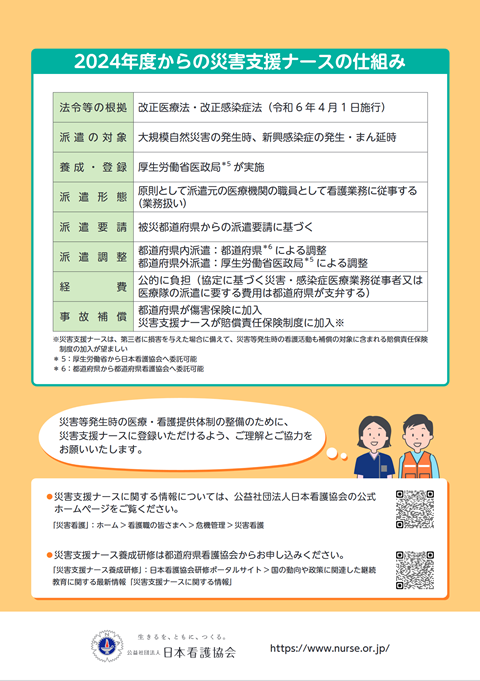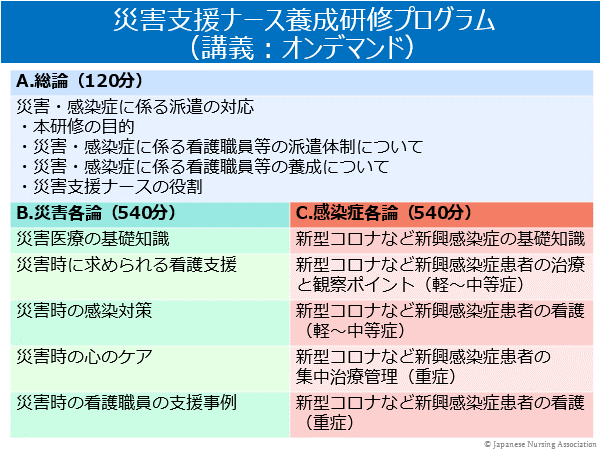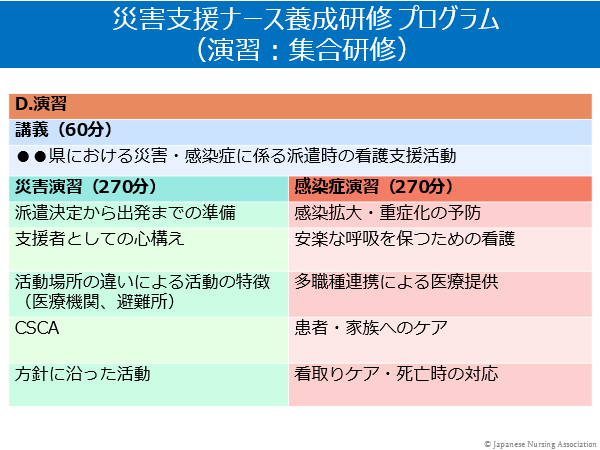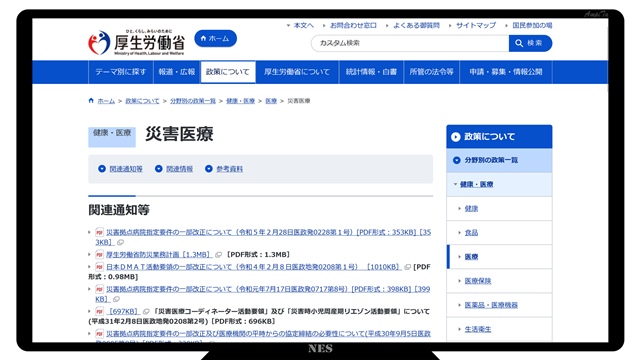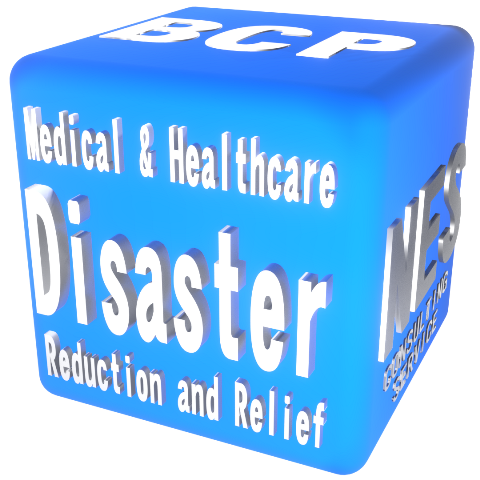We make a living from consulting medical institutions, and because we have clinical experience, we often receive inquiries about “disaster nursing”.

Disaster Nursing
If you search on Google for “disaster nursing”, the Japan Nursing Association will be nominated as the first. When you open the website of the Nikka-kenkyo, it looks like the figure below.
There is an article called “Disaster Support Nurse” there.
Disaster Relief Nurses provide the necessary nursing care for the health of the residents of the affected areas.
Disaster Relief Nurses are not allowed to call themselves, but are called disaster support nurses who have completed the disaster support nurse training training conducted by the Medical Administration Bureau of the Ministry of Health, Labour and Welfare and registered with the Ministry of Health, Labour and Welfare’s Medical Administration Bureau.
[Reference] Japan Nursing Association: Disaster Nursing
Some kind of specialty medicine.
Disaster nursing and disaster relief nurses are considered to be like specialized departments, just like emergency care and intensive care.
As an expert, specialized knowledge, skills, and experience are required to be responsible for this.
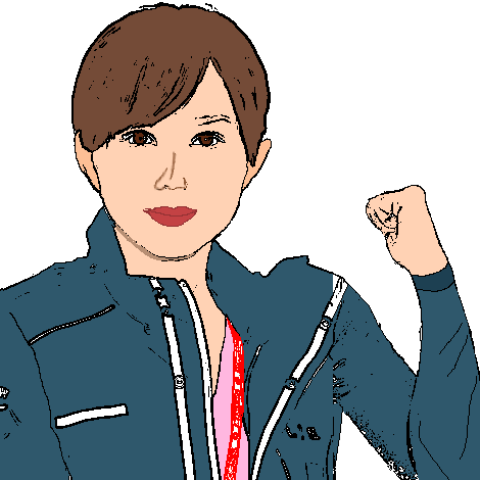
*. Disaster nursing and medical care are not medical departments.
[Reference] Japanese Medical Association: Review of the method of the name of the department
[Reference] Japanese Society of Intensive Care Medicine: Doctor’s Notification Form “Incentive Therapy Department”
Disaster Nursing for Nurses’ Eggs
Learning “disaster nursing” at a nursing school is very important.
Even if it is not a job that many nurses do, it is a job that nurses should do without any occupation, so I think that what you should know as an egg of a nurse.
I think it is good for nursing students to be interested in disaster nursing and study hard, but it may be a little different to become a nurse specializing in disaster nursing as a new graduate.
If you look at the website of the Japan-Caurant, you need to learn a number of arguments written as “basic knowledge”. In order to be selected as a target of the training, it is considered that it is necessary to have a certain amount of experience.
The “disaster support nurse” defined here seems to require the ability to be backed by experience as a nurse, so even if nursing students look for a disaster support nurse as a job, they may not find it.
[Reference] Japan Nursing Association: Disaster Nursing
Disaster base hospital
If you want to make disaster nursing a profession, studying during your student days is not in vain.
However, I think that the information you know after your experience as a nurse and the information you know from inexperienced experience will make a big difference in the way you perceive the same resource.
If there is a possibility that you can experience disaster sites in practice, you will have more opportunities to find employment at disaster base hospitals.
At the disaster base hospital, there is a place for education and training on “disaster medical care”, and I think that there are doctors and nurses who can serve as lecturers.
I think that just because it is easy to experience the opportunities for human resource development, I think that it will bring us closer to the opportunity to make a living in disaster nursing.
[Reference] Ministry of Health, Labour and Welfare: Disaster Medical Care
City or Region
If you were to work at a disaster-based base hospital with the aim of making disaster nursing a livelihood, which would be better, a hospital in the city or a rural hospital?
There are more than eighty disaster-based hospitals in Tokyo, but since there are many large-scale hospitals such as university hospitals, it is thought that there are hundreds to more than a thousand nurses. In other words, the competition for a limited number of disaster nursing seats may be fierce.
There are two basic disaster base hospitals in Hyogo, but Hyogo Prefecture Disaster Medical Center and Kobe Red Cross Hospital are the same building, and there are two in the name, but it seems that it can be seen as one practically one.
I have the impression that there are many disaster base hospitals in Shizuoka for the population. There are twenty-three hospitals in Shizuoka Prefecture and seventeen in Mie Prefecture, which are wary of the Nankai Trough earthquake, and the size of the hospital beds are large and small, so it seems that there are hospitals with favorable conditions to win the in-hospital competition.
Yamagata Prefecture and Okayama Prefecture, which are said to have few disasters, may have more training to travel to various parts of the country as DMAT than the assumption of the disaster at their own hospital, so it may be good in terms of human resource development.
| Prefectures | Core | Regions |
|---|---|---|
| Hokkaido | 1 | 33 |
| Aomori Prefecture | 2 | 8 |
| Iwate Prefecture | 1 | 10 |
| Miyagi Prefecture | 1 | 15 |
| Akita, Japan | 1 | 12 |
| Yamagata Prefecture | 1 | 6 |
| Fukushima Prefecture | 1 | 11 |
| Ibaraki Prefecture | 1 | 17 |
| Tochigi Prefecture | 1 | 12 |
| Gunma | 1 | 16 |
| Saitama Prefecture | 3 | 19 |
| Chiba Prefecture | 5 | 22 |
| Tokyo, Japan | 2 | 81 |
| Kanagawa, Japan | – | 35 |
| Niigata Prefecture | 2 | 12 |
| Toyama Prefecture | 2 | 7 |
| Ishikawa Prefecture | 1 | 10 |
| Fukui Prefecture | 1 | 8 |
| Yamanashi Prefecture | 1 | 9 |
| Nagano Prefecture | 1 | 12 |
| Gifu Prefecture | 2 | 11 |
| Shizuoka Prefecture | 1 | 22 |
| Aichi Prefecture | 2 | 36 |
| Mie Prefecture | 1 | 16 |
| Shiga Prefecture | 1 | 9 |
| Kyoto Prefecture | 1 | 12 |
| Osaka, Japan | 1 | 17 |
| Hyogo Prefecture | 2 | 17 |
| Nara Prefecture | 1 | 6 |
| Wakayama Prefecture | 1 | 9 |
| Tottori Prefecture | 1 | 3 |
| Shimane | 1 | 9 |
| Okayama, Japan | 1 | 11 |
| Hiroshima Prefecture | 1 | 18 |
| Yamaguchi Prefecture | 1 | 14 |
| Tokushima Prefecture | 1 | 10 |
| Kagawa, Kagawa | 1 | 9 |
| Ehime Prefecture | 1 | 7 |
| Kochi Prefecture | 1 | 11 |
| Fukuoka Prefecture | 1 | 32 |
| Saga Prefecture | 2 | 6 |
| Nagasaki Prefecture | 2 | 12 |
| Kumamoto Prefecture | 1 | 14 |
| Oita Prefecture | 2 | 12 |
| Miyazaki Prefecture | 2 | 10 |
| Kagoshima Prefecture | 1 | 13 |
| Okinawa Prefecture | 1 | 12 |
[Reference] List of disaster-based hospitals (as of April 1st, Reiwa)
A nurse’s place to work.
Cases of not hiring nurses in medical institutions are rare. Visit to the operating room, such as anesthesiology and psychosomatic clinics, etc., are scattered, but many nurses who provide “medical assistance” are also working at the clinic.
In the scene where a nurse works as a nurse, nursing is involved in some way.
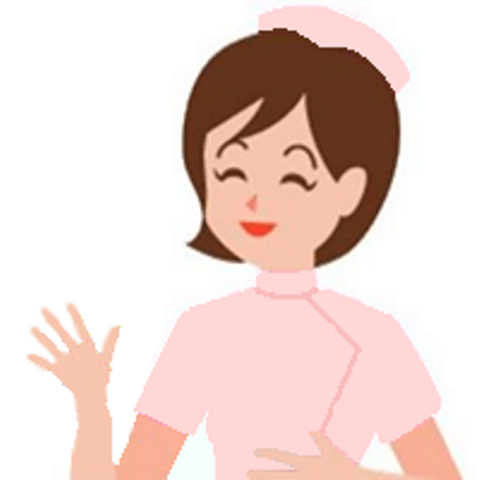
[Reference] Hyogo Prefecture Nursing Association: Nursing workplace
[Reference] Kawasaki City Nursing Association: Various places for nursing work
What you need is “Nursing in the event of a disaster”.
Disaster nursing and disaster support nurses are limited to some nurses because they are specialized, but “Nursing in the event of a disaster” is faced by nurses regardless of specialized level.
If you are nursing in normal times, there are nurses who are present in the disaster somewhere, and I think there are many nurses who gather because the workplace is damaged.
If nurses in the field are required to continue nursing so as not to jeopardize their lives and health in the event of anything, it is thought that “nursing in the event of a disaster” is more in demand than “disaster nursing” that specializes in disasters.

Many of our customers are outside of the disaster base hospital
We support disaster mitigation and disaster countermeasures, but there are very few disaster base hospitals among its customers.
We use our consulting services to ensure that universal medical institutions and elderly care facilities can continue their important work in the face of an emergency situation.
Although we do not take new patients, there are many medical institutions that are responsible for peacetime medical care, such as continuing to treat inpatients who are present at disasters, and we are prepared to accept all local births.
There are a lot of nurses out there, and a lot of nurses are involved.
There are a lot of nurses in the event of a disaster.
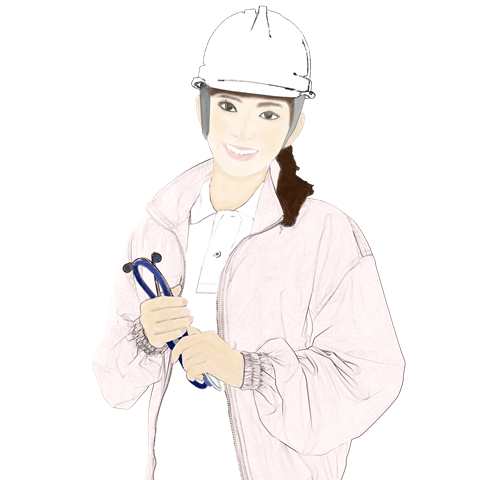
Nursing practice in times of disaster
There is bound to be chaos at the scene after the disaster.
In normal times, the electricity and running water that can be used as a matter of course are stopped, and in a big earthquake, the ceiling and glass may fall and shatter.
If you look outside, you may see a fire, a collapsed building, and a bloody flood of people, such a scene.
Some people may panic.
You have to take care of them in very difficult situations.
You need the ability to find out what is executable nursing, what nursing is required, and what is required of it from a limited information.
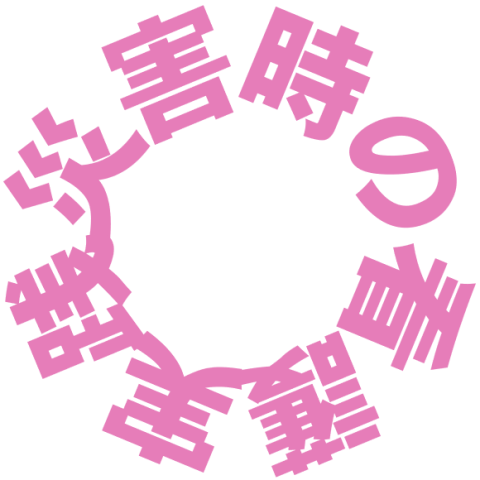
Resources and limits
When comparing disaster nursing and disaster nursing, there is a big difference between the target patients.
Disaster nursing caters to the maximum number of patients who can respond to the resources they can provide. In other words, there is no lower limit, but there will be a limit somewhere.
Nursing in the event of a disaster provides nursing within the scope of the hospital, such as hospitalized patients only. There is a clear lower limit because no one can leave.
If there are three nurses who can move and there are fifty patients, I will continue to provide nursing for fifty people. Providing a number of patients without sufficient resources is a severe part of nursing care in times of disaster.
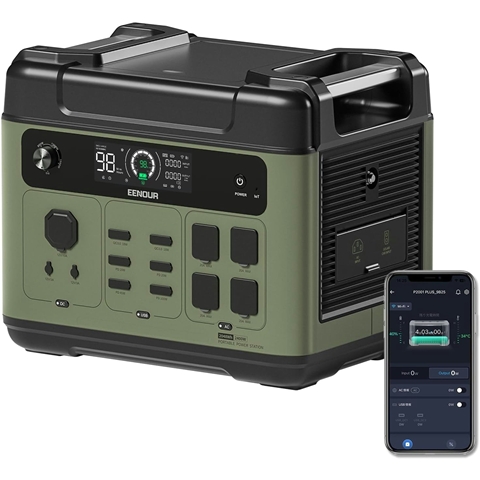
Difficult to pass on lessons
Disaster medicine and nursing have many opportunities to listen to experience stories at academic conferences and seminars. The speaker is also easy to organize, and you can have the feeling of “teaching”.
In the event of a disaster, there are many different types of nursing care, ten people, and the medical care that is performed in peacetime is different, so the contents practiced in the event of a disaster are also different. As a speaker, it seems confusing just to think about where to explain from where, and which part was the ingenuity in the event of a disaster, because it is so individualistic.
“Ten days of nursing after the disaster that continued to shrink the business”
“Nursing in the ward of medical care for ten days after the disaster”
Even if I try to attract customers with the above title, I feel that there is no impact and the feeling that “it will be somehow” will come out.
“Ten-Day Record of Disaster Nursing”
“Nursing Emergency Outpatient Clinic of Disaster Base Hospital”
With the title like the above, it feels like adrenaline is likely to come out, and the hall may be full.
In reality, I think it is more difficult to provide nursing in the event of a disaster that requires flexible change than academically systematized disaster nursing.
In terms of taking care of people’s lives and health, they are all responsible for their important work.
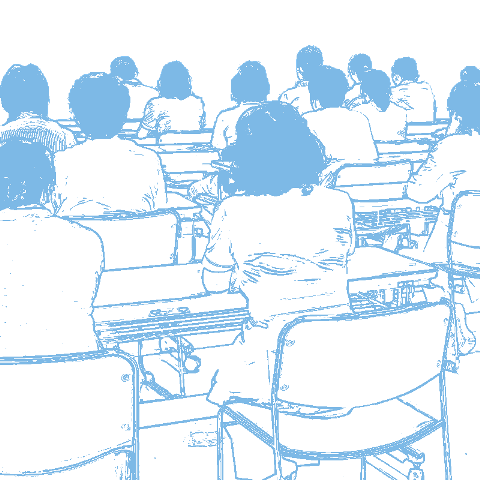
Our company is “goal-oriented” thrust
At our company, we provide education and training so that we can take goal-oriented actions for the practice of nursing in the event of a disaster.
Goal-oriented action (GOA) is a problem that solves the problem regardless of the process in the middle.
We set common goals and policies in the hospital, and as we move toward them, we encourage autonomous and independent actions so as not to wait for instructions.
On the other hand, I also care not to be disordered.
Management is what you need there.
In peacetime, through exercises and training, you will decide the border line in the hospital.
Some rule deviations are acceptable, but we will know the disadvantages there, acquire the technology and knowledge so that we can solve the problem in a safe way as possible, and enrich the stockpile.

Promoting illegal activities (?)
We cannot promote illegal activities, but if you lose your life because you obey the law, that will remain a problem.
Article thirty-seven of the Criminal Code “Emergency Evacuation” is as follows:
(Emergency evacuation)
Article thirty-sevenIn order to avoid the present danger to the life, body, liberty or property of oneself or another person, unavoidable acts shall not be punished unless the harm caused by it exceeds the extent of harm sought to avoid. However, an act beyond that degree may be reduced or exempted from the sentence depending on the circumstances.
2 The provisions of the preceding paragraph shall not apply to persons with special obligations in the course of business.
Criminal law
Whether this applies or not is due to the degree of harm and the “situation” as it is based on the “degree of harm”, so there is no guarantee on a case-by-case basis
Also, I don’t want to break the law here.
When asked whether it is necessary to search for crosswalks and protect red lights, it may be difficult to make a decision when asked whether it is necessary to cross the crosswalk while the tsunami is approaching, but if you take action even if it violates the Road Traffic Law here, I think that it is necessary to think about why crosswalks and traffic lights exist.
If you come into contact with a car while crossing the road, you may not be able to escape the tsunami in the end, and people who were driving a car or participated in the rescue may be caught in the tsunami.
When you are doing goal-oriented behavior, we will not neglect safety confirmation in particular.
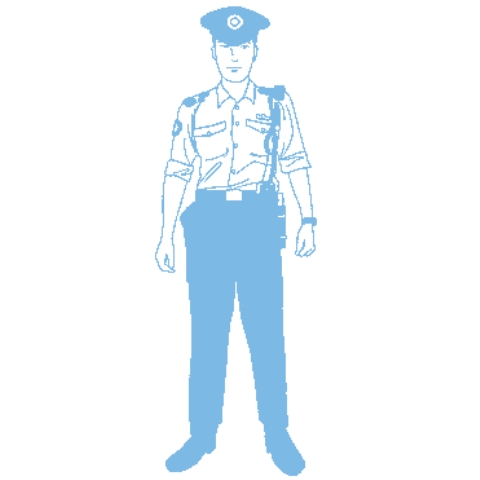
Difficult to teach from school teachers
I think it is a dead word, but the phrase “I am not afraid if I cross the red light with everyone” has become popular.
Of course, I think that there is a backlash when I introduce only the words “I am not afraid if I cross the red light with everyone” from the teacher who teaches the right thing.
Before the Edo period when there were no traffic lights, it was a horse or a rickshaw, even though it was a vehicle, and the traffic volume was small, so it is thought that traffic control was established by “handing over”.
If the traffic light is an extension of the concession, it may be a self-assertion to choose that people on one side take the option of not giving up and that they can cross the red light together.
Since the tsunami is coming, I think that it is difficult for school teachers to say that school teachers should ignore red lights, even if they are allowed to discuss based on the background situation, everyone should run in the same direction and ignore the red light as many people as possible.

If it’s a black signal.
If it is a tsunami after a major earthquake, there is a possibility that there is a power outage. If there is a power outage, the traffic lights will also be turned off. If it is a black signal, there is no negation.
The signal after a power outage will be a place of “joriken” until guidance by police officers begins.
If this concession is a smooth road, you can hand it over with a gentle heart, but it seems that it is difficult to establish because everyone is in a hurry somewhere in the chaotic period after the disaster.
Roundabouts are useful there.
It seems that there are many in Europe, but in Japan it is a very small ring intersection. There is no signal, and the vehicle goes around the circular intersection to the desired exit.
Since there is no signal, it is a non-power-resistant intersection.
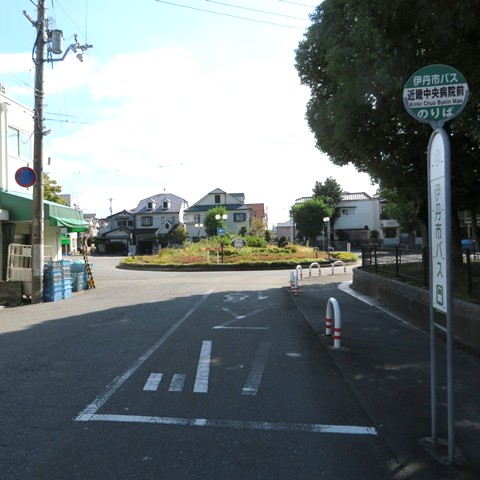
[Reference] JAF: What is a roundabout (circular intersection)?
[Reference] Google Map: Kurumazuka and Tomimatsu Roundabout
[Reference] Regional Revitalization after the Earthquake – 1.17 –
How to learn nursing in the event of a disaster
Now, when I return to nursing in the event of a disaster, I often get questions such as “How should I study?”
In the case of nursing in the event of a disaster, there are different things to learn in terms of what kind of abilities you have as a base, and what kind of abilities your colleagues have.
If we are learning in common, it is knowledge to improve the ability to respond.
In order to think about what you can do when water is cut off, what you can do when a water supply truck comes, what kind of setup is good, and whether nurses should participate, you need various knowledge.
In nurses, eggs, chicks, veterans, and managers, what you need to learn is also very different.
Since it is not established as an academic discipline, it may be a study method to acquire broad and shallow knowledge.

The author’s lecture.
The author may teach you about medical care and nursing in the event of a disaster.
At that time, I am not holding know-how seminars that teach broad and shallow knowledge.
I will explain the basic idea, what purpose you will learn it.
By having them imagine scenes such as “who is the right person to take a bird’s-eye view of all occupations in the hospital”, I have my role clarified.
Nurses are multi-tasking on a daily basis, and craftsmen like multi-skilled workers shine, but in the event of a disaster, they will be the bearers of various things even more.
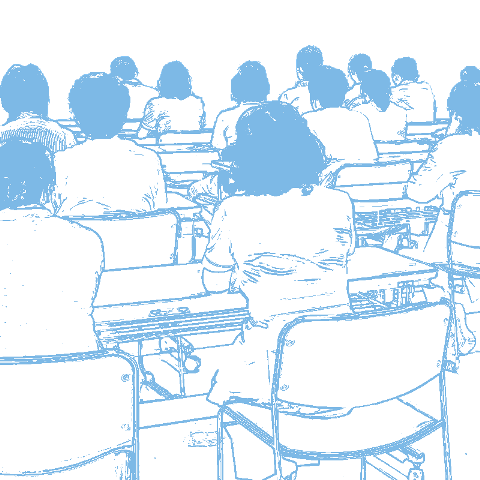
Lecture at a nursing school
I don’t have any experience at nursing school as of today.
An acquaintance who experienced the Great Hanshin-Awaji Earthquake from the standpoint of a firefighting administration has been going to lectures at nursing schools nationwide.
I can’t speak as a victim, but I think I can tell stories based on my past experience, such as the knowledge I should know as a medical worker and the skills I should acquire.
I would be grateful if you could give a lecture and an opportunity for nursing students.
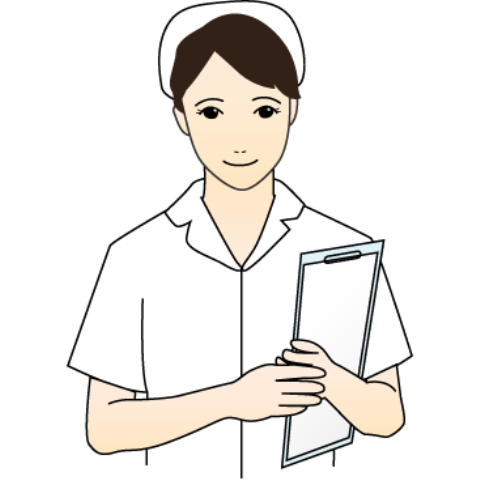
In conclusion
This time, we introduced the difference between “disaster nursing” and “nursing in the event of a disaster”.
There is no doubt that it is a nurse’s job.
I think that disaster nursing is a job that involves some nurses, and nursing in the event of a disaster is like a job involving all nurses.
It seems that disaster nursing is established as an academic discipline, but since nursing in the event of a disaster is an interdisciplinary position related to various fields, and there are no experts, so I think that systematic educational methods have not been established.
Before we can learn what to learn, I think it is necessary to think about what nurses will do in the event of a disaster and how to continue nursing in peacetime.
This time, I dug deep thinking, “What if I were asked to give a lecture by a nursing school?” I would like to think about a message to deliver to future nurses, eggs and chicks.
Please read to the end, thank you.

